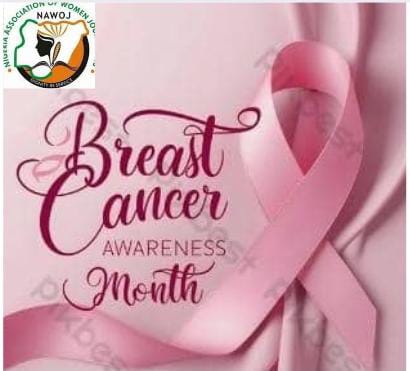By Abiodun JIMOH
As the Breast Cancer Awareness Month draws to a close, the Nigeria Association of Women Journalists (NAWOJ), Lagos State Chapter, has called on government agencies, healthcare providers, and development partners to embrace the World Health Organization (WHO) 60-60-80 strategy to improve breast cancer outcomes among Nigerian women.
In a press statement signed by the Chairperson of NAWOJ Lagos, Mrs. Jumoke Falayi-Johnson, the association emphasized the need for enhanced access to quality cancer care, stressing that early detection and prompt treatment remain key to reducing breast cancer mortality.
Falayi-Johnson highlighted the WHO Global Breast Cancer Initiative (GBCI) 60-60-80 framework as a life-saving model, aligning with this year’s theme, “Every Story is Unique, Every Journey Matters.”
“The 60-60-80 approach means ensuring that 60 percent of invasive breast cancers are detected no later than stage two, that definitive diagnosis is made within 60 days of first medical consultation, and that at least 80 percent of patients complete their treatment,” she explained.
According to her, the adoption of this strategy would significantly improve survival rates and provide hope for thousands of women battling the disease.
“When a woman fighting breast cancer sees the support systems and structures in place for her recovery, she becomes more determined to survive. It’s a chain — support, structure, survival,” Falayi-Johnson stated.
She further urged collective responsibility in the fight against breast cancer, noting that awareness, accessibility, and affordability must be priorities for all stakeholders.
“The woman in a remote village should not have to fight alone. Whether you are a civil servant in Alausa, a doctor in Ikeja, or a journalist in Obalende, you can contribute to ensuring that every woman gets a fair chance at survival,” she said.
Reaffirming NAWOJ Lagos’s commitment to the cause, Falayi-Johnson pledged that the association would continue to serve as a vital link between survivors and institutions responsible for care and policy interventions.
“Let’s end breast cancer by ensuring it doesn’t end more lives,” she concluded.














